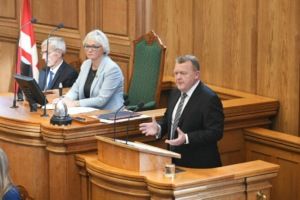Opinion
This Week’s Editorial: Tantamount and trivial
Ejvind Sandal
This article is more than 8 years old.

Lars and Pia are back in session (photo: Hasse Ferrold)
Danish MPs are back at work in Parliament after the long summer break, but the political situation has not really changed much.
The polls indicate a red majority if there was a general election today, albeit a fragile one that would struggle to put together a coherent government program – unless Dansk Folkeparti leaves the blue bloc, of course.
But apart from occasionally forming majorities with the biggest red party, Socialdemokratiet, to annoy the PM, it is unlikely it will leave its key position as a fundamentally blue party able to influence everything.
Putting the record straight
Former PM Helle Thorning-Schmidt has spent her time in London writing a book presenting her version of events from the time she formed a pink government with SF and the Radikale.
It is undeniable she became Denmark’s first female PM, but she also had to give concessions to Radikale and its leader Margrethe Vestager. The latter is now sitting as a commissioner in Brussels where she is “enforcing, not legislating” – pursuing big corporations for tax evasion mostly.
In her book, the ex-PM defends everything she did, but her liaison with SF, who took on governmental responsibility for the first time, led to the implosion of the party. It remains to be seen if the party is ready to go another round.
Nobody wants a new general election and it is not mandatory for another two years unless the distribution of refugees in the country severely impacts the local political picture.
No budget as yet
In Parliament we have witnessed a strange start to the season, with no budget yet forthcoming.
Car registration tax reforms are in place, with some tax relief on bigger cars, and by extension tax relief for the top income tax bracket sneaked in through the back door, as the front door is hermetically closed.
Defence policy-makers are heeding President Trump’s call for an increase in spending. A majority has agreed to support that. The installation of missiles on Danish frigates, a modern fully-equipped brigade of 4,000 personnel, and a lot of hardware and cyberware have been agreed upon.
The real threat, however, is still somewhat blurry. Unfortunately, the money cannot be spent quickly, as it takes time to do the requisite shopping, so what should the state do with the cash at hand? More welfare or general tax relief? We shall see.
The great unmasking
One measure that does not cost anything cash-wise is the prohibition of face veils – a measure of principle more than practice as the few Muslim women wearing them are exotic figures on the streets of Denmark. But legislation is one thing, enforcement another. And besides, it is already illegal to cover your face at a demonstration, so drug peddlers in Christiania with balaclavas are in jeopardy this winter.
Austerity-wise, the race to the bottom has reached a new low. Leading politicians’ arguments for continuing down this path were interesting, but more interesting still were the voices pointing out that ‘enough is enough’.
Nothing and nobody is above Folketinget; apparently, hardly anything is too trivial for it either.

About
Ejvind Sandal
Copenhagen Post co-owner Ejvind Sandal has never been afraid to voice his opinion. In 1997 he was fired after a ten-year stint as the chief executive of Politiken for daring to suggest the newspaper merged with Jyllands-Posten. He then joined the J-P board in 2001, finally departing in 2003, the very year it merged with Politiken. He is also a former chairman of the football club Brøndby IF (2000-05) where he memorably refused to give Michael Laudrup a new contract prior to his hasty departure. A practising lawyer until 2014, Sandal is also the former chairman of Vestas Wind Systems and Axcel Industriinvestor. He bought the Copenhagen Post in 2000, and since June 2017 he has been a co-owner.










































